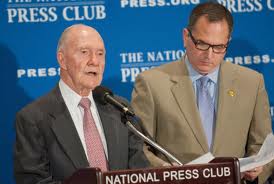Between
hundreds of emails clogging my in-box every day, countless telephone
pitches and personal interactions over the course of a career, I've
had all kinds of experiences with professional communicators. Most
have been positive, but a few stand out as remarkable, and not in a
good way. We're glad to hear story ideas, or pitches, but some left
something to be desired. This is about process, not particular
stories.
One
should be quick to add that there are excellent actors and poor
performers in every profession, including journalism. So, this isn't
an exercise in bashing. People of all experience levels and
capabilities are trying to get stories in front of journalists.
A
few of the "greatest misses” since these were definitely not
“greatest hits":
1)
"Your competitor is reporting"... or "a newspaper is
running a story today that"...
This
is almost always a non-starter. If one of our rivals has gotten an
exclusive or has done an enterprise story, more often than not we're
going to pass. Some entities think it is worth the risk to hand a
story to another shop. If that happens, we don't want to be eating
news leftovers. We want the exclusive. If that isn't possible,
we want to get it first.
2)
"You guys ran a story"... If we already have the story,
why are you pitching us? Now, it could be that there's another angle
that advances or, or adds a broadcast element to a story running in
print. But that's not what people are typically offering.
3) "I have a guest idea for
your show", or a possible "article". We
don't expect that everyone understands exactly what we do, but a
minimal amount of research or use of that “Internet” search thing
can provide a lot of useful information. Fact is, I don't have a
"show" and my work primarily shows up on broadcast/online
platforms, such as radio or video. Starting a conversation based on a
faulty premise isn't helpful. If you need to talk with a
colleague elsewhere in the organization, we can help get you to that
person.
4)“Hi, Mark, how was your
weekend. Is it hot there?” Answering
my phone, someone I don't know starts off failing to identify
themselves or asks a personal question.
Since I don't work at a call center, I will often stop them and ask
who is calling. We usually can tell within 10 to 20 seconds whether a
pitch is worth pursuing. Since time is usually precious, is it best
for us to work through the pitch ASAP. Some folks will be
argumentative once we've figured the story isn't a good fit.
Not productive.
5)
You'll need to register on our website before we tell you who to
contact in our organization. Please
don't require us to create a username and password on your Internet
site to allow us get a media contact. We
often need quick access to information and to get to the people who
can facilitate it. There are few things more frustrating than
organizations that refuse to put their media contacts on the public
or newsroom side of their site. So, we're not enthusiastic about
trying to remember yet another username/password combination. Basic contact information, including name, email and cell phone number, should be part of any news release.
6)
We sent you a news release, but we're not available to respond to any
possible follow-up. Any number of times
we've been sent news releases with contact information that isn't
relevant when the release goes live. The person is on vacation or
their voice mail is full.What's the use in sending the release out
then?
7)
We won't be able to connect you with an example of
a person cited in the news release. We
were told that a majority of members of a trade organization shared a
specific concern about the economic outlook. Being in broadcast news,
I followed up to ask if they could connect us with one of those
people to go on camera. Amazingly, they told us several times in the
following days that no one could be provided. It is counterproductive
to put out a release stating something supposedly widely believed and
then being unable to provide a single person who can stand behind or
verify the claim. How about anticipating that broadcast and other
journalism organizations will naturally ask for an individual example
and have people ready to go at a reasonable time?
Finally,
there are many, many examples of stellar communications
professionals, some of whom I count among my very good friends. They don't need to be told about any of this.
In the spirit of full disclosure, I'm blessed to have been married for
more than 20 years to a professional communicator. So, I raise these
examples with the goal of engaging in a discussion how the process
can work better.


